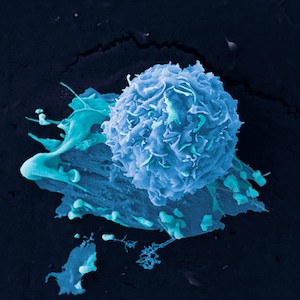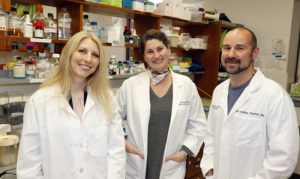Breast_SPORE News

|
‘Multi-omics’ reveals treatment option for breast cancer subtype In a multidisciplinary collaboration, researchers at Vanderbilt University Medical Center and the University of Miami Miller School of Medicine have identified a subtype of triple-negative breast cancer (TNBC) that appears to be able to escape detection by the immune system and evade immunotherapy. Friday, November 18th, 2022 |

|
Study identifies biomarker for breast cancer response to immunotherapy A biomarker that has proven to be a predictor for response to immunotherapies in melanoma patients also has clinical relevance for breast cancer patients, according to a new study published in Clinical Cancer Research, a journal of the American Association for Cancer Research. Friday, August 12th, 2022 |

|
Grant strengthens breast cancer research efforts Breast cancer researchers at Vanderbilt-Ingram Cancer Center have secured a fourth round of continuous Specialized Program of Research Excellence funding. Saturday, August 31st, 2019 |

|
A critical factor for wound healing Vanderbilt-Ingram Cancer Center scientists have discovered a role for a tumor suppressor protein in skin wound healing. Friday, July 19th, 2019 |

|
Breast cancer-killing RIG A recent study in the journal Cancer Research demonstrates that a RIG-I agonist has potent immunogenic and therapeutic effects in breast cancer. Friday, December 14th, 2018 |

|
Study seeks to boost breast tumor immune response Targeting specific molecules in breast tumors, called methylating agents, can turn up the immune response, potentially making tumors responsive to immunotherapy, suggests a new study published in Nature Communications. Thursday, February 8th, 2018 |

|
Study to test combination therapy for breast cancer Vanderbilt-Ingram Cancer Center has received $2.3 million to fund a clinical research trial testing a combination of three immunotherapy compounds for patients with a specific type of advanced breast cancer. Friday, October 27th, 2017 |

|
Drivers of breast cancer metastasis Overexpression of HER2 (human epidermal growth factor receptor 2) is found in about 25 percent of breast cancers and is associated with poor outcomes. HER2-amplified breast cancers use signaling through a complex of proteins called mTORC2 to drive tumor formation, tumor cell survival and resistance to HER2-targeted therapies. Rebecca Cook, Ph. Thursday, July 27th, 2017 |

|
Breast cancer program lands new research grants Several investigators in Vanderbilt-Ingram Cancer Center’s (VICC) Breast Cancer Program have received grant awards to support translational research that may improve disease outcomes for patients. The grants totaling more than $3 million will fund mechanistic science and clinical trials designed to test novel therapy combinations and determine why some forms of breast cancer become resistant […] Friday, March 24th, 2017 |

|
Study details rare heart risk of certain cancer therapies Combination therapy using two approved immunotherapy drugs for cancer treatment may cause rare and sometimes fatal cardiac side effects linked to an unexpected immune response. In a study led by Vanderbilt University Medical Center (VUMC) investigators and published in the Nov. 3 issue of the New England Journal of Medicine, researchers describe two cases of […] Monday, November 7th, 2016 |

|
Study explores how some breast cancers resist treatment A targeted therapy for triple-negative breast cancer (TNBC), the most aggressive form of breast cancer, has shown potential promise in a recently published study. TNBC is the only type of breast cancer for which there are no currently approved targeted therapies. The new study led by Vanderbilt-Ingram Cancer Center (VICC) investigators has identified gene alterations […] Thursday, April 21st, 2016 |


